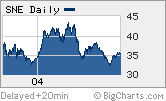NEW YORK (CNN/Money) - Sony has an enviable brand name. But will that be enough to get consumers to buy more of the Japanese tech giant's gadgets this holiday season?
While Sony has been getting a lot of praise this week on Wall Street for snagging studio MGM and its rich library of classic movies, Sony's struggles in its core consumer electronics business continue to hold back the stock. Shares of the company's American Depositary Receipts (ADRs) have been relatively flat this year.
Electronics sales in the first half of the year were down slightly from a year ago. That's a problem, considering that the division accounted for nearly two-thirds of Sony's overall revenue.
Sony has been making some efforts to boost its fortunes in consumer electronics. There have been recent reports that Sony is trying to negotiate for more U.S. shelf space with retailers Wal-Mart and Costco.
Stephen Baker, a consumer electronics analyst with market research firm NPD Group, said that this would be a good move. He argues that relying mainly on just consumer electronics retailers like Best Buy and Circuit City has hurt the company.
"Part of the problem Sony has had in the past couple of years is that as the consumer electronics market has changed," Baker said. "A lot of it has been about lower prices and distribution and neither have been Sony's strong points."
But in some respects, having more products available at discounters could dilute the company's image.
"It will be a challenge for Sony to grow in mass market retail outlets while at the same time maintaining the premium brand name associated with Sony," said Michael Gartenberg, research director with JupiterResearch.
Better late than never?
Sony also faces an uphill battle in several categories where it was late to the game, such as the emerging digital TV market. Sony, to be sure, has a presence there. But it has been playing catch up to rivals like Samsung, Sharp and Panasonic.
 |
|
| Shares of Sony have given up nearly all their gains from earlier this year. |
"Sony was not early in the plasma TV market even though consumers showed interest in it," said Gartenberg. "Other Asian competitors were able to get products out faster and capture the minds of consumers."
So far, Sony's success in the digital TV area has been more on the high-end as opposed to lower-priced models. That could hurt Sony if cheaper models wind up being the bigger sellers during the holiday season.
"When we look at flat-screen TV data, it seems that people typically want a Cadillac for the price of a Kia," said Baker.
Another product category that Sony has been slow to enter is the white-hot digital music player market.
| Related stories
|

|
|
|
|
Sony has just begun to aggressively its new digital music player, the NW-HD1. This is the latest version of Sony's ubiquitous Walkman portable music player. Commercials feature Macy Gray singing a cover of Aerosmith's "Walk This Way."
But can Sony supplant Apple's wildly popular iPod in the hearts of music lovers? That will be a tough challenge. To many of teens and young adults, the Walkman is like, you know, so 1987.
"Today's generation thinks of the iPod the way that a generation ago thought of the Walkman," said Gartenberg. "Apple has built a phenomenally strong brand. People are not saying, 'I want an MP3 player.' They're saying, 'I want an iPod.'"
Baker agrees that Sony, despite its pedigree as a portable music pioneer, has little chance of making a major splash in the digital music area anytime soon.
"In the next year and a half there is no way anybody can catch Apple," said Baker. "The iPod has all the buzz."
Of course, Sony remains a leader in many other areas of consumer electronics. Video games are still a big business and the company's cell phone partnership with Ericsson has been doing well.
But unless Sony can make bigger inroads in the hottest areas of consumer electronics during the holidays, the company's stock performance may continue to be as flat as a LCD screen.

|

